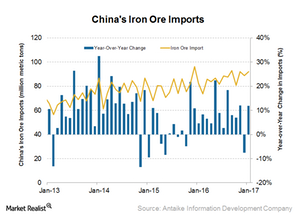What China’s High Iron Ore Imports Suggest
China imported 92 million tons of iron ore in January 2017—a growth of 12.0% YoY and 3.4% month-over-month.
Nov. 20 2020, Updated 2:47 p.m. ET

Second-highest iron ore imports
China imported a total of 92 million tons of iron ore in January 2017, which represents a growth of 12% YoY (year-over-year) and 3.4% month-over-month. This is also the second-highest monthly import volumes on record.
One reason for such strong volumes might be steel mills’ move to replenish inventory ahead of the Chinese new year. This was also somewhat expected, as exports from Australia and China were quite strong in December 2016.
However, iron ore exports from Australia fell during January as compared to December. This slowdown might show up in China’s iron ore import data for February.
But contrary to what was expected by many market participants, China’s iron ore imports were also quite robust in 2016. They hit a yearly record in 2016. China’s 2016 iron ore imports came in at 1.0 billion tons, an annual rise of 7.5%.
Resilient demand
This rise was the result of two factors: resilient steel demand in China (partly driven by government stimulus measures) and the replacement of Chinese domestic iron ore production by the import of cheaper high-grade ore imports, mainly from Australia and Brazil.
While steel demand growth in 2017 depends on many factors such as construction sector growth and government stimulus, China’s crackdown on pollution will likely keep the replacement demand for iron ore going in 2017.
Customs data and China’s iron ore imports
China tracks its iron ore imports through customs data. This information is important for investors because it provides a good idea of the appetite for imported iron ore among Chinese mills and traders. China consumes more than two-thirds of all seaborne iron ore, and so its import appetite affects iron ore players involved in seaborne iron ore trade. These companies include Cliffs Natural Resources (CLF), Vale (VALE), and Rio Tinto (RIO).
The iShares MSCI Global Metals & Mining Producers ETF (PICK) invests in iron ore, and this information has an influence as well. BHP Billiton (BHP) is PICK’s top holding, making up 16.7% of the fund. The SPDR S&P Metals & Mining ETF (XME) also invests in some of the above-mentioned stocks.
In the next part of this series, we’ll discuss what’s supporting the current trend in steel production in China.
